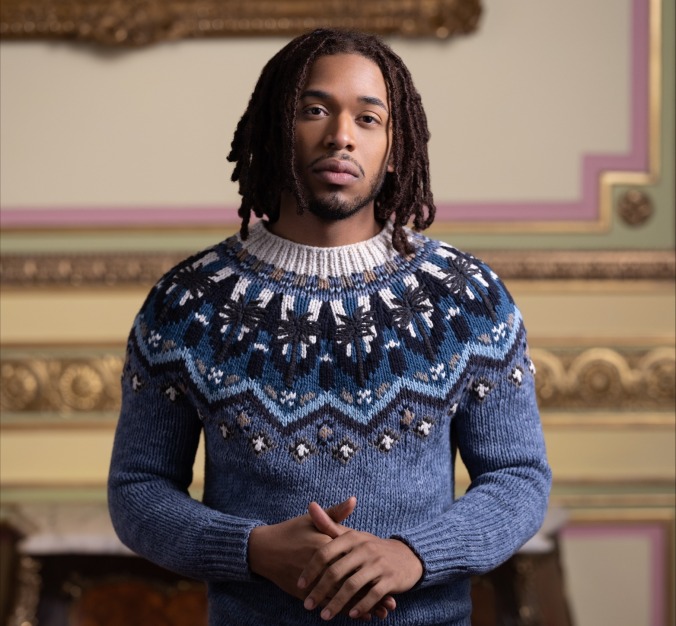Who's Next Q&A: Kelvin Harrison Jr. on the "incredible" Chevalier and the Oscar-winners he really wants to work with
With upcoming roles as Dr. Martin Luther King Jr. and Scar in The Lion King, Kelvin Harrison Jr. has momentum on his side

Part of the job description of a rising Hollywood star, the kind of person who tops a “Who’s Next” list, is being busy. So it’s no surprise that Kelvin Harrison Jr. had to squeeze The A.V. Club into a packed day of press, photo shoots, and travel as he gears up for the spring release of Chevalier, one of the first films that features him in the leading role. Harrison will bring to the screen the real-life story of Joseph Bologne, Chevalier de Saint-Georges, a French Creole composer, contemporary of Wolfgang Amadeus Mozart, and world-class fencer.
The role adds to Harrison’s résumé of historical figures, including B.B. King in Elvis and Fred Hampton in The Trial Of The Chicago 7, along with his performances as a troubled high schooler in Waves and a lovestruck himbo in Cyrano. And since Harrison’s 2020 BAFTA EE Rising Star nomination, his career has really kicked in. Other projects on Harrison’s horizon: Dr. Martin Luther King Jr. in Genius: MLK/X, and Scar in Mufasa: The Lion King. We can’t wait for Harrison to reach Hollywood’s stratospheric heights, but in the meantime, we chatted with him about Chevalier and blue-sky dreaming in this crazy business today.
The A.V. Club: What can you tell us about Chevalier? Did I pronounce it okay?
Kelvin Harrison Jr.: Yeah! Chevalier. Beautiful, that was it. Some people say “chevre-lear” and it makes my toenails curl. I think what’s really cool about the movie is that we just didn’t know about this guy. I remember the first time I got the script, I didn’t even hear about him. I mean, my dad’s a classical music teacher, and I’ve never heard of Joseph Bologne. I looked him up and the first thing was like the New York Times article that [said], “Joseph Bologne is his real name, not Black Mozart.” And I was like, Oh my God, this guy’s been called Black Mozart all this time? It just kind of put me into a tailspin, thinking about how it’s always in comparison to some white counterpart. I think what’s exciting is to know that this guy was the best fencer in Paris. He was one of the most incredible, dynamic composers in France. And arguably better than Mozart. I said it! I said it. And I think it’s really cool just to get to see this kind of action-figure type dude take over Paris. It’s going to be fun. This movie is fun, honestly, more than anything else.
AVC: And what did playing Joseph Bologne teach you in terms of craft? How different was it from other roles you’ve done?
KH: This was more time-consuming. A period piece is a lot of specific details that you need to know, a lot more history involved. Language is a little bit tighter. Obviously, I had to learn how to play the violin and how to fence. And that took up most of my year. So yeah, it’s one of those movies where you have to learn special skills in order to actually pull it off.
I got the job when I was filming Elvis, so I immediately started my research then. And I was going to start playing violin while I was in Australia. But I wanted the music to come first. The actual compositions that Joseph Bologne plays in the film, Michael Abels wrote. So once I got the music, I started working on that. My dad’s a classical music teacher, so I went home immediately and got a violin, he got a violin. We went into the back house and just started just doing basic long bow strokes and finger exercises. And we would spend about four to six hours a day, six days a week. And seven we might take off because, you know, everybody needs a break or otherwise you won’t retain anything. And I did that for about three months. And I got a new violin teacher when I went to L.A. and continued my training. And when I got to Prague, which is where we shot the movie, I got another violin teacher who stayed with me throughout the duration of the production. And yeah, it was intense.
AVC: In terms of navigating this business, what is the best piece of career advice you’ve ever received?
 Keep scrolling for more great stories.
Keep scrolling for more great stories.
